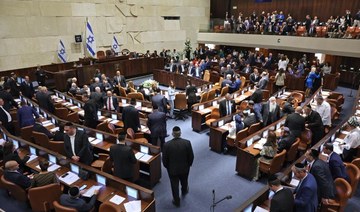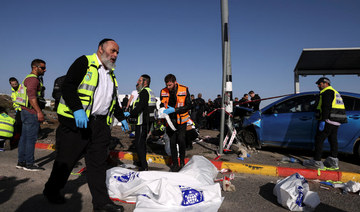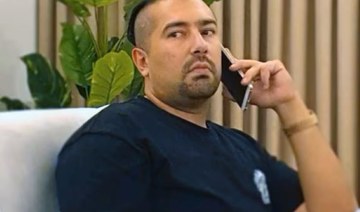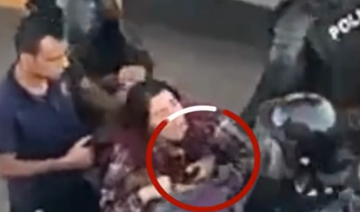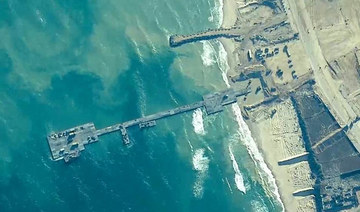JERUSALEM: Tens of thousands of Israelis — hoisting flags, blowing on horns and chanting “democracy” and “no to dictatorship”— protested outside the parliament building on Monday as Prime Minister Benjamin Netanyahu’s government formally launched a contentious plan to overhaul the country’s legal system.
It was the largest protest outside the Knesset in years and reflected the deep divisions over the plan. The proposed changes have triggered weeks of mass demonstrations, drawn cries of protests from influential business leaders and former military men and even prompted a statement of concern from President Joe Biden.
Despite a plea from the nation’s figurehead president to put the legislation on hold, Netanyahu’s allies approved a series of legislative changes during a stormy committee meeting Tuesday. The vote now sends the legislation to the full parliament for a series of votes — an opening salvo in a battle expected to stretch on for weeks.
“They hear our cry. They hear the strong voice of truth,” opposition leader Yair Lapid said from the stage outside parliament. “They hear it and they’re afraid.”
Netanyahu and his supporters say the proposed changes are needed to rein in a judiciary that wields too much power. But his critics say the judicial overhaul is tantamount to a coup and will destroy Israeli democracy. They also say that Netanyahu, who is on trial for a series of corruption charges, has a conflict of interest.
The protesters came from across the country. Organizers said that upwards of 100,000 people were in attendance. Trainloads of people arrived in Jerusalem on packed trains, streaming up escalators in the city’s main train station chanting, “democracy,” cheering and whistling, and waving the national flag. A few hundred others gathered in protest at Jerusalem’s Western Wall, the holiest site where Jews can pray, before marching toward the Knesset.
In parliament, opposition lawmakers vocally protested the proposed reform to judge appointments ahead of a committee vote that would send the bill to the full parliament for a vote. During an unruly session, members of the opposition stood on the conference table and shouted as a key Netanyahu ally tried to hold the vote. The motions passed in a 9-7 committee vote.
Throngs of people marched to the Knesset, the Israeli legislature, a day after the country’s figurehead president urged Netanyahu’s government to delay its proposed changes to the judiciary — moves that critics say will weaken the country’s Supreme Court and erode democratic checks and balances.
Many protesters carried the blue and white Israeli flag and posters decrying what they saw as attack on the country’s democratic institutions. “Shame! Shame!” and “Israel will not be a dictatorship!” they chanted.
Other demonstrations were held outside schools around the country.
Netanyahu and his allies took office in December after the country’s fifth election in less than four years. That election, like its predecessors, focused on Netanyahu’s fitness for office at a time when he is facing serious criminal charges.
Netanyahu has lashed out at the country’s police, prosecutors and judges, saying he is the victim of a deep-state style conspiracy to oust him. His critics say he is motivated by a personal grudge and his campaign will destroy Israel’s democratic system of checks and balances.
The legislation approved in committee Monday would give Netanyahu’s parliamentary majority the authority for appointing all of the country’s judges — a step that critics say could pave the way for his trial to be dismissed. A second change would take away the Supreme Court’s authority to review the legality of major pieces of legislation, known as Basic Laws.
His coalition also plans on passing another law that would give parliament the power to overturn Supreme Court decisions it dislikes.
Taken together, critics say this will destroy the country’s system of checks and balances and unleash a process similar to those in authoritarian countries like Poland and Hungary.
Eliad Shraga, chairman of the Movement for Quality Government, a civil-society group that organized Monday’s demonstration, said the gathering was meant to send a message of support to the Supreme Court and a warning to the Knesset.
“We will fight to the end,” he told The Associated Press. “They want to change Israel from a liberal democracy to a dictatorship, a fascist dictatorship.”
Late Sunday, President Isaac Herzog appealed to Netanyahu to put the legislation on hold and open a dialogue with the opposition. Netanyahu has not responded to the appeal.
Thousands march in Israel as Benjamin Netanyahu’s allies push overhaul
https://arab.news/vjuet
Thousands march in Israel as Benjamin Netanyahu’s allies push overhaul
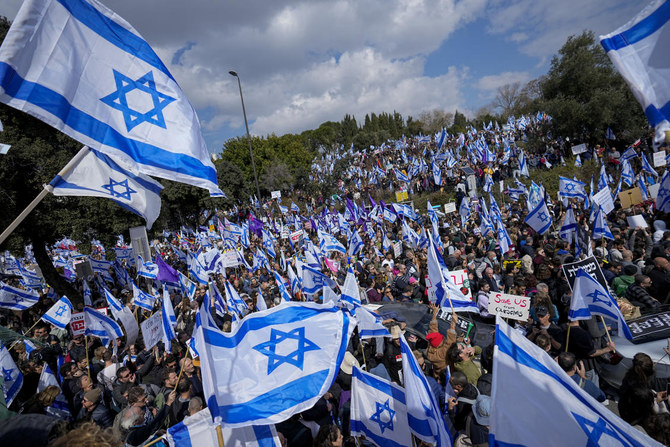
- Benjamin Netanyahu’s government formally launches a contentious plan to overhaul the country’s legal system
Israeli military finds bodies of 3 hostages in Gaza, including Shani Louk, killed at music festival

The military identified the other two bodies found as those of a 28-year-old woman, Amit Buskila, and a56-year-old man, Itzhak Gelerenter
JERUSALEM: Israeli military says its troops in Gaza found the bodies of three Israeli hostages taken by Hamas during its Oct. 7 attack, including German-Israeli Shani Louk.
A photo of the 22-year-old Shani’s twisted body in the back of a pickup truck ricocheted around the world and brought to light the scale of the militants’ attack on communities in southern Israel.
The military identified the other two bodies found as those of a 28-year-old woman, Amit Buskila, and a56-year-old man, Itzhak Gelerenter. Military spokesman Rear Adm. Daniel Hagari said all three were killed by Hamas at the Nova music festival, an outdoor dance party near the Gaza border, and their bodies taken into the Palestinian territory.
The military did not give immediate details on where their bodies were found.
Hamas-led militants killed around 1,200 people, mainly civilians, and abducted around 250 others in the Oct. 7 attack. Around half of those have since been freed, most in swaps for Palestinian prisoners held by Israel during a weeklong ceasefire in November.
Israel says around 100 hostages are still captive in Gaza, along with the bodies of around 30 more. Israel’s campaign in Gaza since the attack has killed more than 35,000 Palestinians, according to Gaza health officials.
Iran arrests 3 Europeans at ‘Satanist’ gathering along with 260 others, Tasnim says

- Those detained comprised 146 men and 115 women and that alcohol and psychedelic drugs were seized.
DUBAI: Iranian security forces have arrested more than 260 people, including three European nationals, at a “Satanist” gathering west of the capital Tehran, the semi-official new agency Tasnim reported on Friday.
“Satanist network broken up in Tehran, arrests of three European nationals,” Tasnim wrote, adding that those detained comprised 146 men and 115 women and that alcohol — banned under Iran’s Islamic laws — and psychedelic drugs were seized.
The report did not give the nationality of the Europeans.
Spain PM will Wednesday announce date to recognize Palestinian state

- Sanchez said in March that Spain and Ireland, along with Slovenia and Malta had agreed to take the first steps toward recognition of a Palestinian state
MADRID: Spanish Prime Minister Pedro Sanchez said Friday he will on Wednesday announce the date on which Madrid will recognize a Palestinian state along with other nations.
“We are in the process of coordinating with other countries,” he said during an interview with private Spanish television station La Sexta when asked if this step would be taken on Tuesday as announced by EU foreign policy chief Josep Borrell.
Sanchez said in March that Spain and Ireland, along with Slovenia and Malta had agreed to take the first steps toward recognition of a Palestinian state alongside Israel, seeing a two-state solution as essential for lasting peace.
Borrell told Spanish public radio last week that Spain, Ireland and Slovenia planned to symbolically recognize a Palestinian state on May 21, saying he had been given this date by Spanish Foreign Minister Jose Manuel Albares.
Ireland’s Foreign Minister Micheal Martin said Tuesday that Dublin was certain to recognize Palestinian statehood by the end of the month but the “specific date is still fluid.”
So far, 137 of the 193 UN member states have recognized a Palestinian state, according to figures provided by the West Bank-based Palestinian Authority.
Despite the growing number of EU countries in favor of such a move, neither France nor Germany support the idea. Western powers have long argued such recognition should only happen as part of a negotiated peace with Israel.
Israel army says civilians torched Gaza-bound aid truck in West Bank

- Driver as well as Israel soldiers were injured in the attack
JERUSALEM: Israel’s military said Friday that “dozens of Israeli civilians” set fire the previous evening to an aid truck in the occupied West Bank headed for war-torn Gaza.
Local media reported that Israeli settlers were behind the attack, which the army said injured the driver as well as Israeli soldiers.
The incident took place near Kokhav Hashahar, an Israeli settlement in the central West Bank, a territory occupied by Israel since 1967.
According to the army, Israeli soldiers intervened to “separate the Israeli civilians from the attacked Israeli driver” and provided medical assistance.
The group then “responded with violence,” and three Israeli soldiers were “lightly injured,” the army said, condemning “all forms of violence against its soldiers and security forces.”
On Monday, dozens of people blocked and vandalized a convoy of aid trucks driving to the Gaza Strip.
Israeli media identified them as part of a far-right group opposed to allowing aid into Gaza.
The trucks were attacked in Israel, shortly after passing through the Tarqumiya checkpoint from the West Bank.
Images posted on social media show Israeli soldiers watching on as the attackers destroy the aid.
The latest incident comes just hours after the army said on Thursday that the Tarqumia and Beitunia checkpoints “now also function as inspection points for aid” destined for Gaza.
Jordanian authorities said “Israeli extremists” in the West Bank attacked two aid convoys sent on May 1 from Jordan and another convoy of 35 trucks sent on May 7.
Israel has been fighting their bloodiest war ever in Gaza since the Palestinian militants attacked Israel on October 7.
Despite the United Nations warning of looming famine, Israeli authorities have tightly controlled much needed humanitarian aid into Gaza over the course of more than seven months of war.
Very little aid has made it through Kerem Shalom crossing in southern Gaza, and Rafah crossing has been completely shut since Israeli troops took control of the area last week.
Israel has vowed to defeat remaining Hamas forces in the southern city of Rafah, which it says is the last bastion of the group whose October 7 attack triggered the war.
The Hamas attack on southern Israel resulted in the deaths of more than 1,170 people, mostly civilians, according to an AFP tally based on official Israeli figures.
More than 35,303 Palestinians, mostly civilians, have been killed in Gaza since the war broke out, according to data provided by the health ministry in the Hamas-run territory.
Saudi Arabia, UAE ‘the locomotives of the region’ says French trade commissioner

- Vision Golfe returns for a second edition June 4-5 at the French Ministry of Economy in Paris
- The benchmark event between France and the Gulf countries aims to promote trade and economic relations
DUBAI: After the success of its first edition, Vision Golfe returns for a second edition June 4-5 at the Ministry of Economy, Finance, Industry and Industrial and Digital Sovereignty in Paris.
The benchmark event between France and the Gulf Cooperation Council countries aims to promote trade and economic relations, building on a long-standing relationship between France and the GCC states, particularly between France and Saudi Arabia.
“Between France and the GCC countries … we have a long story of friendship. We build bridges together based on mutual comprehension, respect, mutual interest, ambition, and our political bilateral relation is absolutely at the top,” said Axel Baroux, trade and invest commissioner of Business France Middle East, in an interview with Arab News in French.
“We have a great and solid commercial and investment relationship, but I think that we can do even more,” he added.
Vision Golfe is a platform to promote business cooperation in markets with high growth potential, and an opportunity to meet key economic players: ministers, start-ups, and senior executives, among others.
“Vision Golfe is a tool, the starting point for negotiations and discussions. Discussions continue throughout the year … our trade and investment grew last year by almost 8 percent,” declared Baroux.
“If I take the figures of the GCC investment in France, we are reaching €14 billion ($15.178 billion) which is exactly €13.7 billion,” he added, while pointing out that the figure is underestimated for not considering indirect investments.
Despite the challenges facing the global economy, Gulf countries continue to offer an environment conducive to investment and talent attraction, leveraging national policies focused on economic diversification, sustainable development, and energy transition.This creates a favourable atmosphere for the establishment of companies in various sectors such as energy and new technologies, as well as sectors such as healthcare, education, retail, and tourism.
As the two largest markets in a region marked by considerable growth in trade, Saudi Arabia and the UAE are today “the locomotives of the region,” Baroux says.
This explains the rise in French companies setting up operations and participating in major projects and trade in the Gulf.
Baroux highlighted his participation in a delegation of French companies in Saudi Arabia, with over 120 companies taking part in the event organized by Business France and the MEDEF, in the presence of the director general of Business France, Laurent Saint Martin, French foreign trade advisors, and Bruno Bonnell, the secretary-general for Investment FRANCE 2030.
“We were admirably received. Agreements were signed with STC and Business France. We also visited the PIF, and had discussions with MISA,” he added.
The UAE also offers opportunities for French companies across sectors, with “more than 600 French companies on ground … Translating into direct employment, projects and a solid economic relationship,” according to Baroux.
“We have very strong, very solid bilateral economic relations between France and the GCC and it is a reason why we expect Vision Golfe to be the annual rendez-vous, the annual meeting, where all the companies from the GCC and from France can meet together in Paris,” he added.
HIGHLIGHTS
It aims to present success stories of major partnerships that contribute to the strategies of Gulf countries.
The program includes an opening speach by Business France CEO Laurent Saint Martin, in the presence of ministers from France and the GCC, and a panel addressing “The Gulf at the crossroads of Asia and Europe” to kick off two days of panels and meetings.
Thematic and sector-specific discussions and round tables are on the agenda, with topics including but not limited to:
• Converging national strategies
• Building sustainable partnerships
• How to invest and set up a business in the Gulf
• Energy for the future: sustainable energy and resource management after COP28
• Cooperation and investment opportunities in various sectors
• France as Europe’s most attractive destination for foreign direct investment
Economic diversification, innovation, artificial intelligence, infrastructure, and transport development are among the themes addressed during the second edition.
The French touch and know-how will also be in the spotlight, in the presence of a number of guests and speakers, such as Jean Yves LeDrian, chair of the French Agency for the Development of AlUla, the CEO of NIDLP Suliman Almazroua, the secretary-general of the UAE International Investors Council, Jamal Saif Al-Jarwan, with the participation of the Abu Dhabi Investment Office, Mohamed Bin Zayed University, and Kuwaiti and Qatari groups to state a few.
“Vision Golfe 2023 was a real success, and of course, I expect more for Vision Golfe 2024. More B2B meetings, more partnerships, even more interaction between French companies and GCC companies. We will have this year at Vision Golfe 2024 some key agreements that will be signed, during the session,” said Baroux.



